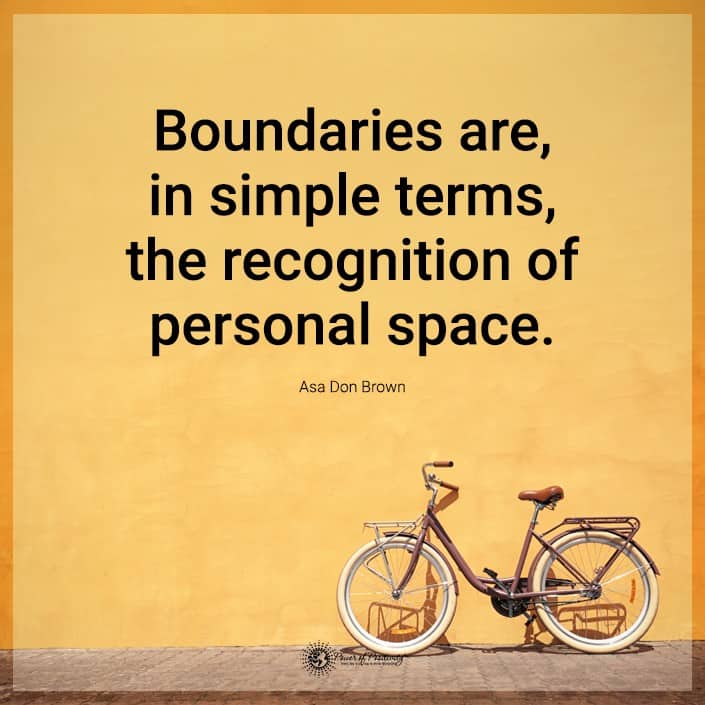Why is it crucial to be proactive when establishing personal and professional boundaries? The celebrated poet Robert Frost once observed that good fences make good neighbors. The sooner other people see your fence line, the better.
What are the Five Types of Boundaries?
Your parents taught and enforced basic guidelines to protect you. As you got older, you added some of your own according to your preferences. These are the five basic categories of personal perimeters.

1. Physical
Imagine that you are encased in an invisible bubble. The size of everyone’s bubble varies according to their comfort zone. It represents your body, personal space, and privacy.
2. Intimacy
These are your standards for the intimate touch and conversations you expect or find uncomfortable. When you say “no,” or “enough,” you mean what you say, and there should be no questions.
3. Emotional
Some people are reserved and aren’t comfortable with self-disclosure. Maybe you’ll only share your feelings with your partner and the people in your circle, or you may gradually take your time and reveal your inner emotions.
4. Intellectual
It takes trust and confidence for you to share your deepest thoughts and ideas with another person. If someone ignores you and acts like your thoughts are trivial and foolish, they’re not respecting your intellectual guidelines.
5. Financial
Here’s a standard that can get tricky when it involves family and close friends. Your money is your business, and you have the right to manage it as you choose. While you are generous, one of your standards may be that you rarely, if ever, loan money.
People who respect your relationship rules won’t even ask. They understand that these are the guidelines you’ve established. Those who insist on loans or are nosey about your finances have no regard for you or the relationship.
10 Ways to Be Proactive with Your Boundaries
Do you want to save time and frustration in personal and professional relationships? Let them know where you stand first, and there’ll be less confusion. Here are twelve ways to help you get on the right path.
1. Set Your Boundaries Early in the Relationship
Being proactive with your boundaries can help you minimize any misunderstandings from the start. Of course, you don’t want to spout off a bunch of rules and regulations the moment you meet a potential love interest. However, establishing your perimeters early is essential if it progresses into a relationship.
Misunderstandings and hurt feelings will be less likely, and you’ll know where you stand. People respect you more in personal or professional relationships when you have standards. Please don’t wait until someone crosses a line before you draw it.
2. Begin with Smaller Ones
It’s easy to become overwhelmed when you start with a hefty list of dos and don’ts. You may find it less stressful if you start with smaller boundaries, especially if you don’t have many in place.
You can still be proactive and go at your own pace. Eventually, you keep perimeters that work and discard ones that don’t suit you. These standards will probably evolve as your relationship does.
3. Reflect on How Your Boundaries Benefit You
The whole idea of having boundaries is to protect your heart and dignity. Once you’ve established some basic rules, you have time to reflect on them. You know what and who, but you must also know the whys.
Have toxic or traumatic experiences in the past negatively affected your perimeters? Perhaps you’ve drawn your circle so small that nobody can fit into your life anymore. If your standards aren’t benefiting you, it’s time to discover why they aren’t working.

4. Be Consistent
The only way to be genuine and transparent in any relationship is to be consistent. If you establish a set of rules for one day, they should be the same daily.
For example, you’ve been proactive and clarified that you don’t want to move in together for a while. You may give mixed signals if you begin rearranging your significant other’s furniture. Make sure you’re transparent with them; never say one thing and do another.
5. Don’t Allow Social Media to Blur Them
Until the start of the internet, couples chatted on landline phones when they weren’t meeting face-to-face. They also sent greeting cards and love letters by post when their lover was away. Now, relationships can develop quickly with smartphones and other electronic devices.
Couples can instantly message their lover throughout the day. While social media can be an exceptional communication tool, it has its downfalls.
You don’t want personal information and every photo splashed over the Internet. Social media can often blur your parameters unless you take a stand. Be proactive and let your partner know if anything crosses the line, digital or not.
6. Be Comfortable with Saying “No” While Setting Boundaries
According to an article published by the Greater Good Science Center, being a chronic people-pleaser doesn’t benefit you. Helping others isn’t the same as trying to please them. While you’re trying to satisfy everyone, you’re neglecting your own needs and wants.
The easiest way to stop trying to please people is a polite but firm “no.” There will always be worthy causes and individuals who need a hand. How often have you been hit with a request to do something because nobody else will do it?
If folks see you as a pushover, you’ll forever be asked to chair committees, contribute money, and babysit for free. Do yourself a favor and be judicious with your time, money, and resources. Stop permitting people to walk all over you; you must learn to say “no.”
When you set limitations on what you will and won’t do, you’ll be free to be involved in projects you genuinely enjoy. You want to be compassionate and help your friends and family in need. Remember that you are an occasional helping hand, not a permanent crutch.
7. Gain a Healthy Perspective
Your perimeters are meant as guidelines and not chains. Don’t be so dogmatic with them that you can’t breathe. Building too many walls may keep you safer, but they inevitably make you a self-imposed prisoner.
It’s easy to overthink your safety zone when you’ve been in an abusive or toxic situation. You may be hypervigilant and suspicious of everyone who crosses your path. How can you revise your standards while keeping your safety and dignity intact?
An article published by Harvard Medical School explains that concentration meditation can help you gain focus and clarity. Journaling is also a beneficial tool for discovering new perspectives. Many people also find that therapy can help them review and sort their boundaries.
8. Maintain Open Communication
How can anybody know your perimeters unless you tell them? Mind reading may be a fun carnival trick, but it doesn’t work in real life. If you want people to respect you, let them know how you expect to be treated.
Be proactive and discuss your boundaries in a personal or professional relationship. Effective communication is especially crucial with your mate. Share frequent and meaningful conversations about each other’s thoughts, feelings, and ideas.
Since communication is a two-way street, each side speaks and listens. You don’t want to just “hear” each other. Active listening takes time to consider what’s being said and empathize with the speaker’s emotions. Don’t forget to ask for clarifications to lessen the chances of a misunderstanding.
9. Add to Your Basic List as Needed
Relationships mature just like people, and your perimeters may need to widen. You may not have foreseen some situations or see things differently. Either way, you can clarify them or revise them as needed.
The same can be said of your professional relationship with co-workers. There are probably set guidelines that everyone follows out of respect for each other. However, you can add different perimeters to maintain your comfort and self-esteem.
10. Respect Other People’s Boundaries
You can’t expect other people to respect your wishes if you don’t respect theirs. When you do, you prove that you’re a respectful and trustworthy person. It can strengthen your relationships at home, work, and public.
The best way to provide mutual respect is to listen to each other. You accept each other as you are without pushing for changes. Everyone is an individual, and you respect their right to autonomy. Instead of pointing out everyone’s flaws, work on your shortcomings.

Final Thoughts on Being Proactive with Your Boundaries
You are responsible for creating and enforcing your standards. While compromise is part of any healthy relationship, nobody should ask you to give in to these things. Be your advocate, teach people how you want to be treated, and show them the same courtesy.
The post 10 Ways to Set Proactive Boundaries Before Someone Hurts You appeared first on Power of Positivity: Positive Thinking & Attitude.


